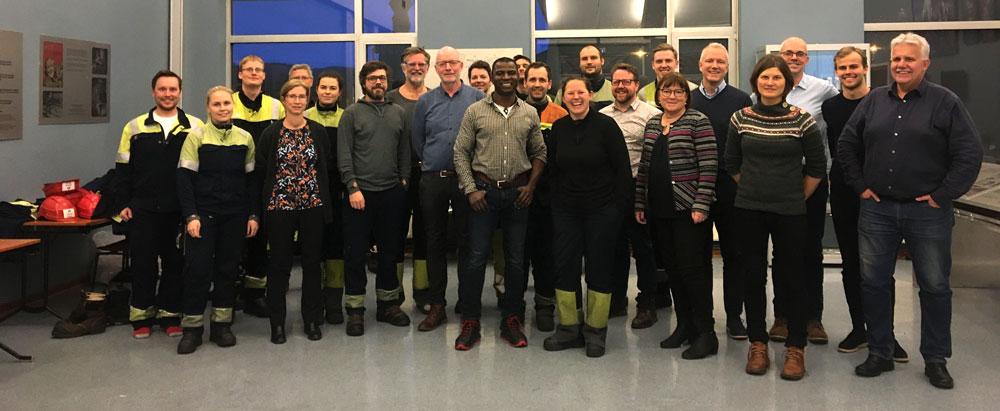|
|
|
|

|
|
# 7 2019
|
|
|
|
|
Kun fornybar oppvarming og kjøling i Europa innen 2050 er mulig
|
|
|
|
Full dekning av varme- og kjølebehov i Europa i 2050 med fornybar energi er målet til energiteknologi- og innovasjonsplattformen RHC-ETIP. Fornybar oppvarming og kjøling. ETIP er opprettet av EU-kommisjonen for å samle ulike ekspertaktører innen energisektoren. Arbeidsgrupper satt sammen for å styrke arbeidet RHC-ETIP består av paneler med eksperter innenfor områdene bioenergi, … Read more
|
|
|
|
|
|
HighEFF visits Alcoa
5th December representatives of FME HighEFF visited industry partner Alcoa at their aluminium production plant in Mosjøen together with representatives from SFI Metal Production.
|
The intention of this workshop was to meet employees at Alcoa and to get a more detailed picture of the challenges and possibilities within the energy use and waste heat utilization at this plant.
|
NTNU and SINTEF participants first presented overviews of R&D within the respective research centres and then Alcoa arranged for a two hour guided tour through their plant, allowing us to see the real picture of the operation in this plant, including the available energy sources, logistics for anode production and transport, power supply and distribution and also the detailed process for anode replacement in production hall. This tour was followed up by parallel sessions to conclude on topics of interest for Alcoa within FME HighEFF and SFI Metal Production.
|
On behalf of FME HighEFF I would like to thank Alcoa Mosjøen for this very fruitful visit – it certainly gave us a good insight into the operational aspects and gave us several challenges to address in the continuation of FME HighEFF.
|
|
Petter E. Røkke, FME HighEFF Centre director
|
|

|
|
Hosts and visitors at the visit to Alcoa. Photo: Ellen Myrvold
|
|
|
|
Mandar Thombre
My research interests include devising optimal control strategies for energy-efficient operation of process plants in industrial clusters. A key topic of my research involves accounting for uncertainties that might be inherent in the system, and to apply control methods that can effectively hedge against this uncertainty. Currently, I am looking into optimal operation of a thermal energy storage system in a cluster with multiple suppliers and consumers of energy. The uncertainties in this system can arise from fluctuating heat supply/demand. Application of advanced control methods, like the robust model predictive control, can negate the influence of these fluctuations and lead to higher energy-efficiency. A secondary objective of my PhD is to look at the optimal design of a thermal energy storage tank in a cluster.
|
|
Who is involved in your research?
|
My project is part of RA4-Applications, where the focus is to apply the various available tools to industry-specific case-studies. Specifically, I'm part of WP4.3 - Industry Clusters and Technology Integration. My supervisor is Associate Professor Johannes Jäschke. I have ongoing collaboration with Brage Knudsen from SINTEF, who is also part of RA4 in HighEFF. In addition, some of my case studies are motivated by Mo Industripark, an industrial partner in HighEFF.
|
|
Why is your research important?
|
Industrial clusters have been around for many years, and there has been research on efficient exchange on energy and utilities in these clusters. However, most of the work has focused on static and deterministic models of these systems. From an operation and control perspective, it is important to dynamically optimize the energy exchange in these systems, since one has to contend with many time-varying parameters. Moreover, it is important to incorporate the uncertainty handling in the optimization and control framework. This is because the energy supply, energy demand, energy prices and other critical parameters are subject to uncertainty. My research aims to develop a dynamic and robust framework for optimal operation under uncertainty, leading to higher energy-efficiency and cost savings.
|
|
Tell us about an interesting result.
|
We have analyzed a cluster of heat suppliers and consumers with given supply and demand profiles. The heat exchange between them is considered via two methods: 1) direct coupling without storage and 2) with a thermal energy storage tank. In the case without storage, whenever the supply is larger than demand, there is wastage of heat. When the supply is less than demand, operating costs are high since all the deficit heat has to be purchased externally. It is shown that by using an optimal control framework along with thermal energy storage, the surplus heat in the cluster is used to charge up the tank unit during periods of low demand, and that this stored energy is subsequently used in a low-supply/high-demand scenario. We have further made the framework robust by systematically accounting for uncertainties in the supply and demand.
|
|
PhD Candidate, HighEFF Centre for Energy Efficiency,
|
Process Systems Engineering, NTNU
|
|
|
|
|
|
HighEFF Contacts:
|
|
|
As this is the final newsletter of 2019 I would like to use the opportunity to wish you all a Merry Christmas, hope you will have relaxing Christmas holidays and I look forward to a productive 2020 together with you all!
|
Feel free to share this copy with a colleague or friend. Anyone can subscribe to the newsletter, there is a Subscribe-site on our blog.
|
Kind regards
Petter E. Røkke
FME HighEFF Center Director
|
Our website is up and running. We will use the website to announce upcoming events and workshop, meetings and conferences, news and results. I hope you will find the website interesting and informative and that you will use it frequently.
|
|

|
|
|
 
|
|
|
|
|
|